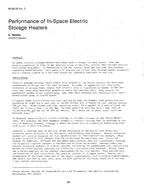The purpose of this study is to investigate thermal comfort for Japanese subjects with a view to energy conservation in buildings under hot and humid conditions. During the summer 172 Japanese college-age subjects wearing 0.6 clo standard clothing were exposed under sedentary activity for 3 hours to 11 different thermal conditions in a climate chamber. It was found that the neutral temperature of Japanese was 79.4 F (26.3 °C). This is not significantly different from previous identical studies with Danish and American subjects. Skin wettedness of Japanese was lower than predicted by SET at high temperatures. High relative humidity was associated with a high percentage of uncomfortable subjects, and the percentage of uncomfortable subjects had a close relation to skin wettedness. Predicted percentage of unacceptable curve for Japanese is also shown and agrees quite well with the PPD model by Fanger.
Units: Dual
Citation: ASHRAE Transactions, 1987, vol. 93, pt. 1, New York, NY
Product Details
- Published:
- 1987
- Number of Pages:
- 14
- File Size:
- 1 file , 1 MB
- Product Code(s):
- D-NY-87-3048


